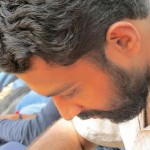 Ajeesh C Philip
Ajeesh C Philip
Kairali
Film: Day
Country: France/2011/DCP/Colour/78'/French-Czech-Urdu
Direction: Armel Hostiou
Production: Gaelle Ruffier
Screenplay: Nicolas Bouyssi, Armel Hostiou, David H. Pickering, Joachim Lepastier
Cinematography: Mauro Herce
---------------------
Film: Polluting Paradise (Der Mull im Garten Eden)
Country : Germany/2012/DCP/Colour/98'/Turkish
Direction, Screenplay: Fatih Akin
Production: Fatih Akin, Klaus Maeck
Cinematography: Herve Dieu, Bunyamin Seyrekbasan
Camburnu is a small mountain village in northeastern Turkey. Thanks to the Black Sea’s mild and humid climate, the villagers have lived for generations off tea cultivation and fishing in harmony with the nature surrounding them. But this idyllic environment is threatened by the government’s decision ten years ago to build a garbage landfill directly above the village. Despite protests by the mayor and the villagers, a waste facility has been built that does not comply with the most important security and building standards and since then has continued to pollute the environment through accidents and disasters. The air is polluted, the ground water is contaminated, the annual rains flush the waste down the slopes, and flocks of birds and stray dogs have besieged the village. The tea growers, whose plantations lie beneath the landfill, have lost their livelihood. The consequences are devastating and clearly evident for everyone to see and yet tons of waste continues to be dumped in the landfill every day.
-------------------
Film: LA PIROGUE (THE PIROGUE)
Directed: Moussa TOURÉ
Country: FRANCE, SENEGAL, GERMANY
Baye Laye is the captain of a fishing pirogue. Like many of his Senegalese compatriots, he sometimes dreams of new horizons, where he can earn a better living for his family. When he is offered to lead one of the many pirogues that head towards Europe via the Canary Island, he reluctantly accepts the job, knowing full-well the dangers that lie ahead. Leading a group of 30 men who don't all speak the same language, some of whom have never seen the sea, Baye Laye will confront many perils in order to reach the distant coasts of Europe.
--------------------
Film: Princess Nahzik
Country: Kyrgyzstan/2012/DCP/Colour/74'/Kyrgyz
Direction, Screenplay: Erkin Saliev
Production: Taalaybek Kulmendeev, Gulmira Kerimova
Cinematography: Hasan Kydyraliev
Nahzik, a 7 year old girl, lives in a small village situated on the picturesque shore of Lake Issyk-Kulwith with her mother Aijan. She works in a trout farm. In the other side of the house, lives a couple: Kolya-baike and Anara-eje, left unemployed after the collapse of the Soviet empire. Kolya-baike is a beekeeper, and a poacher. He sets up fishing nets in the trout farm at night and is assisted by his nephew Arzyke. Sometimes Aijan smuggles a few dozen trouts from the farm and Kolya-baike and Arzyke sell them to the tourists during high season. Everyone struggles to survive in this remote mountainous region, where the “world financial crisis” means little to the locals. Only Nahzik continues to live in her own world of fairy-tales, which is reflected in her drawings. Through Kings and Princesses, the main characters of her fantasies, she expresses pain and longing for a father she never knew. Nahzik’s father has been kept a secret.
One morning Erjan, an artist, arrives in the village from Kazakhstan. He has returned after an unsuccessful trip to Europe, where he tried to sell his paintings. The time of global economic crisis is not the best time to seek glory and money. Eight years passed since the last time he visited, and now he’s back, hiding from financial debt. He stays at Kolyabaike’s, takes walks in the area, starts sketches, and finishes them in his room. Nahzik acquaints Erjan, follows him everywhere, watching a real artist at work. One night she witnesses his intimate meeting with Aijan, who ignores Erjan’s questions about Nahzik. He quickly realizes who Nahzik’s father is. There are endearment and love in his eyes when he looks at the girl. The growing relationship between father and child is cut short by two criminals from Kazakhstan looking for the debtor on the run. Arzyke, in love with Aijan and overwhelmed by jealousy, discloses Erjan’s whereabouts.
Erjan is in trouble and Aijan chooses to help him to escape. Erjan sails off on a motorboat, taking his paintings along. Criminals fire at him in the pitch black night. After discovering the artist’s empty room, Nahzik searches for him throughout the village. Although young, she realizes who Erjan is. “Daad! Daad…” calls Nahzik, running along the shore. This is a story about how world global events have their effect on simple people, living in the most remote areas of civilization; and how even those kinds of events cannot rob someone’s ability to love and to be loved.
------------------------
Film: Flower Buds (Poupata)
Country: Czech Republic/2011/35 mm/Digibeta/Colour/91'/Czech
Direction, Screenplay: Zdenek Jirasky
Production: Viktor Schwarcz, Jordi Niubo, Jaroslav Kucera
Cinematography: Vladimir Smutny
The family of Jarda Hrdina lives in a remote small town near the border. Jarda works as a signalman on the railway. His hobby is making matchstick models in bottles, and his weakness is his addiction to playing slot machines. Jarda’s wife Kamila is a cleaning woman at the railway station’s public toilets. It is her dream to rehearse, together with her peers, the song “Poupata” (flower buds) which they performed at the state-sponsored Spartakiada festival of physical culture twenty-five years previously, and then to perform it for the whole town. Their children, Agáta and Honza, who have just become of age, are without work, without money and without illusions. Honza’s crowd spends their time in the local pub, and together with his friend Cyril he grows cannabis in the basement of their housing project. Agáta senses that she hardly has a chance to get out of the tedium of provincial life. Unplanned, she has become pregnant by the local dandy, Matěj. The only person she confesses her secret to is her friend Magda.
----------------------
Film: Laurence Anyways
Country: Canada-France/2011/DCP/Colour/161'/French
Direction, Screenplay, Editing: Xavier Dolan
Production: Lyse Lafontaine, Nathanael Karmitz, Charles Gillibert
Cinematography: Yves Belanger
Set in the 90’s, a man tries to salvage his relationship with his fiancée after revealing to her his aspirations of becoming a woman.
Laurence Anyways is the story of a wild and unusual love.
--------------------------
KALABHAVAN
Film: On The Road
Country: Brazil-USA-UK-France/2012/DCP/Colour/124'/English
Direction: Walter Salles
Production: Charles Gillibert,Nathanael Karmitz, Rebecca Yeldham
Screenplay: Jose Rivera, Jack Kerouac
Cinematography: Eric Gautier
Just after his father’s death, Sal Paradise, an aspiring New York writer, meets Dean Moriarty, a devastatingly charming ex-con, married to the very liberated and seductive Marylou. Sal and Dean bond instantly. Determined not to get locked in to a constricted life, the two friends cut their ties and take to the road with Marylou. Thirsting for freedom, the three young people head off in search of the world, of other encounters, and of themselves.
----------------------
Film: Poor Folk (Qiongren, liulian, mayao, toudu ke)
Country: Taiwan, Myanmar/2012/DCP/Colour/105'/Mandarin, Thai, Yunnanese
Direction, Screenplay,Cinematography: Midi Z
Production: Midi Z, Patrick Mao Huang
Drug smuggling and human trafficking are the subject of this unexpectedly humorous tale by Burmese/Taiwanese director Midi Z. Following his Return To Burma (VIFF 11), this new multi-ethnic quasi-comedy about two Burmese emigré hustlers in Bangkok and on the road enriches Midi Z’s patiently crafted aesthetic with quietly funny episodes, witty character drama, as well as tense drug-dealing standoffs and emotionally intense family ruptures. All within a very “Asian indie” ethos of long takes and patiently observant, distant cameras.
A-hong is a quiet young Burmese man freshly arrived in Bangkok. He helps out A-fu in the latter’s quasi-legitimate tourist scam business. A-fu leads bus tours of Chinese tourists through Thailand; his long and loopy stories “brainwash” them into shopping sprees, from which he naturally benefits. But the two partners have much more on the go: illicit schemes to sell drug manufacturing compounds to some very shady (and overly well-armed) Thai drug dealers. They cross paths with San-mei, also Burmese, who, with her partner, works as a particularly indolent, low-key prostitute (they read a lot of magazines on the job) when she’s not smuggling young girls across the Myanmar border into Thailand.
----------------------
Film: Sister (L'enfant d'en haut)
Country: France-Switzerland/2012/DCP/Colour/97'/French-English
Direction: Ursula Meier
Production: Ruth Waldburger, Denis Freyd
Screenplay: Antoine Jaccoud, Ursula Meier, Gilles Taurand
Cinematography: Agnes Godard
Long after I had started on the story of SISTER, the memory of a young boy suddenly came back to me. I grew up in the shadow of the Jura Mountains, where going up to a winter resort to ski was part of our everyday life. There was a boy who often used to come skiing on his own, whilst we were always in a group. He skied very poorly, yet blasted flat-out down the pistes, as if he was getting high from the speed and risk. He seemed to derive such pleasure from being “up there†. This boy intrigued me, and then I found out that he was banned from the mountain restaurants because he was suspected of stealing from customers. The people who worked in the resort advised us to keep an eye on our things and to keep away from him. But this little thief continued to fascinate me, perhaps because he didn’t really belong in such a setting, not coming from the social class that has the money to pay for ski equipment and lift passes. His stealing carried on and he ended up being permanently banned from riding up to the resort in the cable car. This young thief − without any friends, skiing like a madman on the snow-covered pistes of the Jura − remained an anonymous mystery for me. At the time, I was barely twelve years old, the same age as Simon in the film, and I still remember him.
-----------------------
Film: The Exam (A Vizsga)
Country: Hungary/2011/DCPColour/89'/Hungarian-Hebrew
Direction: Peter Bergendy
Production: Istvan Bodzsar
Screenplay: Norbert Kobli
Cinematography: Zsolt Toth
The drama is set in 1956 Hungary, when an ambitioius National Security officer is being monitored by his friend and supervisor. The boss discovers secrets that could destroy them both.
------------------------------
Film: War Witch
Country: Canada/2012/DCP/Colour/90'/French-Lingala
Direction, Screenplay: Kim Nguyen
Production: Pierre Even, Marie-Claude Poulin
Cinematography: Nicolas Bolduc
Montreal-based filmmaker Kim Nguyen paints a poignant and harrowing portrait of Komona, a 14-year-old girl (wonderfully played by nonprofessional actress Rachel Mwanza) who has been kidnapped from her African village by rebels to become a child soldier. She escapes from the camp with an older albino soldier and experiences for the very first time the joys of a peaceful and loving life, but a fresh tragedy will force her to confront and fight the ghosts haunting her mind.
Although inspired by a real story that took place in Burma, Nguyen decided to film War Witch in the Democratic Republic of the Congo without giving a specific location to the plot. He worked on the film for 10 years, watching and catching children's points of view with his camera and mixing in tightly edited flashbacks in which the spirits of human beings appear with an ultra-realistic and violent storyline. But War Witch is also a poignant and impossible love story filled with magic, picturesque images, and even light moments like the powerful visit to an albino camp or the chasing of a white rooster.
---------------------
NEW
Film: Rose (Roza)
Country: Poland/2011/35mm/94'/Polish
Direction: Wojciech Smarzowski
Production: Niderhaus Wlodzimierz
Screenplay: Michal Szczerbic
Cinematography: Piotr Sobocinski jr
The narrative of the film is a tale of love, an uneasy one, and on the rocks at that. She is a Masuria inhabitant, German or Polish maybe, which is a relative notion, dependent upon political manipulation; a woman who has suffered misfortune and basest humiliation at the hands first of the Russians and later the Poles. He is Polish; his life has been ruined by the Germans, war and occupation, a wreck of a man, a phantom.
It is a biological instinct of self-preservation that they both share, but it’s soon clear that either can regenerate thanks to the other’s physical closeness. Hence this is a chance of life more than of love. Yet love will finally come at the last moment.
In the background is the fundamental historical layer. The main plot develops, 1945-46, in the former Polish-Prussian borderlands, granted to Poland after WW II. Somewhere between the story of Rose and Tadeusz, the pastor’s prayer, his dispute with God and despair, a tale is spun about Masuria, a nation that fell victim to Polish and German nationalism and was consequently annihilated. Who were the Masuria inhabitants in the mid-20th century, what was distinctive about them? In the same breath we should mention: the Polish origin, German schooling, Slavic customs, German tradition, Polish last names, German first names, Polish language, German writing, Slavic religiosity, Evangelical denomination, apolitical attitudes ...
It is my earnest desire to make this film a mouthpiece in defence of variety, regional and cultural identities, to make it help discern and accept differences of national, ethnic, and religious minorities. I want the Masurian landscape to stay in the viewer’s memory, to make him want to plunge in it, to recall, to teach, and to become enamoured of it.
I hope to elicit your emotions. To move you, that is.
----------------------
Film: Elles
Country: France-Germany-Poland/2011/35mm/Colour/99'/French-Polish
Direction: Malgoska Szumowska
Production: Marianne Slot
Screenplay: Tine Byrckel, Malgoska Szumowska
Cinematography: Michal Englert
The film is set during the course of a day where we find journalist Anne trying to meet her deadline while shopping and preparing the food for an evening meal, entertaining her husband's boss and his wife. She is also worrying about her two sons, the eldest of whom has been skipping classes while the younger appears to be becoming hooked on video games. In between there are flashbacks to the conversations she has had with the two students, scenes from their lives and the effect that their work in the sex industry is having on them and those close to them.
Anne interviews Charlotte in a park where she seems very relaxed about the sex she has with her clients. She has tried doing part-time work but found that her studies suffered so she turned to prostitution. But she still does the occasional shift as she needs to be able to explain to her family and boyfriend where the money comes from. These sexual encounters inevitably lead to conflict in her relationship with her boyfriend who at one point demands to know if she is seeing someone else. Her friendly girl-next-door nature leads her clients to confide in her about their lives - their jobs, their wives - which has surprised Charlotte as she had imagined the work would have been non-stop sex.
Alicja is quite a different person. Arriving from Poland to study in France she not only lost her suitcase but found the student advisers to be less than helpful in her hour of need. Another student came to her rescue but in return for giving her a roof over her head, she had to sleep with him. By the time we see her being interviewed by Anne, Alicja has earned enough to have a very nice apartment along with designer clothes and handbags. She is much more hedonistic than Charlotte and proceeds to get Anne drunk during the course of the interview in her apartment. When asked who her clients are, Alicja simply replies that they are bored husbands. For Alicja, being alone in a foreign country has led her to seemingly much more freedom than she enjoyed at home but when asked if she wanted to stop, she admits that there is an element of addiction with the way she earns money. It is only when her mother comes to stay that we see the harm that her sex work is really having on her life.
There are points in the film where it all looks rather innocent and carefree but we are reminded of the potentially dangerous circumstances that young women can find themselves in with Charlotte falling prey to a violent client. And we are shown that the clients are not creepy weirdos but in fact just ordinary men who you would walk past in the street without giving them a second look - they are both young and old, predatory and insecure.
How the students' lives turn out is left to the viewer to decide with the end of the film focusing more on Anne's life and the effect these encounters with the two students has had on her, and her relationship with her husband.
-----------------------
Film: After the Battle (BAAD EL MAWKEAA)
Country: Egypt- France/2012/35mm/Colour/116'/Arabic
Direction: Yousry Nasrallah
Production: Walid El-Kordy, Georges-Marc Benamou
Screenplay: Yousry Nasrallah, Omar Schama
Cinematography: Samir Bahsan
Mahmoud was one of the horsemen coerced by lowly henchmen for Mubarak's regime into carrying out attacks on protesters in Tahrir Square on February 2, 2011.
He has since lost his job. Humiliated and ostracized, he lives near the Pyramids with his wife and sons.
His family is on the brink of despair when he meets Reem, a secular Egyptian divorcee who works in advertising. She is a fervent revolutionary who lives in a wealthy Cairo neighbourhood. Theirs is the encounter of two people, but also of two different worlds.
---------------------------
Film: Nos Vemos Papa
Country: Mexico
Director: Lucia Carreras
Writer: Lucia Carreras
Pilar loses the one thing in life that mattered to her and, from that moment on time stops. The present begins blending with the past, and the heroine withdraws into a world of her own. An intimate drama about the extreme emotions connected to the loss of someone on whom our lives depend.
----------------------
Film: The Hidden Fortress (Kakushi-toride no san-akunin)
Country: Japan
Director: Akira Kurosawa
Writers: Ryûzô Kikushima, Hideo Oguni , Shinobu Hashimoto, Akira Kurosawa
The film begins with two bedraggled peasants, Tahei and Matashichi (Minoru Chiaki and Kamatari Fujiwara). Through conversation, they reveal that they had intended to fight with the Yamana clan, but turned up too late, were taken for soldiers of the defeated Akizuki clan, and forced to bury dead. After quarreling and splitting up, the two are both captured again and forced to dig for gold in the Akizuki castle with other prisoners.
After an uprising, Tahei and Matashichi escape. Near a river they find gold marked with the crescent of the Akizuki clan. They thereafter travel with the General of the defeated Akizuki clan, Rokurota Makabe (Toshirō Mifune), while escorting Princess Yuki Akizuki (Misa Uehara) and what remains of her family's gold to a secret territory. In order to keep her identity secret, Yuki poses as a mute.
During the mission, the peasants impede it and sometimes try to seize the gold. They are later joined by a farmer’s daughter (Toshiko Higuchi), whom they acquire from a slave-trader. Eventually, they are captured and held by Rokurota's rival; but the latter unexpectedly sides with the Princess and Rokurota.
The peasants stumble upon the gold, but are later captured; whereupon Rokurota explains Yuki's true identity, and states that all of the gold has been used to restore her family's domain. The peasants are then dispatched, taking a single ryō. In the final scene, Tahei gives this to Matashichi to protect; but Matashichi allows Tahei to keep it.
-------------------------
SREE PADMANABHA
Film: When I Saw You (Lamma Shoftak)
Country: Palestine-Jordan-Greece/2012/Colour/93'/Arabic
Direction, Screenplay: Annemarie Jacir
Production: Ossama Bawardi
Cinematography: Helene Louvart
1967. The world is alive with change: brimming with reawakened energy, new styles, music and an infectious sense of hope. In Jordan, a different kind of change is underway as tens of thousands of refugees pour across the border from Palestine. Having been separated from his father in the chaos of war, Tarek, 11, and his mother Ghaydaa, are amongst this latest wave of refugees. Placed in "temporary" refugee camps made up of tents and prefab houses until they would be able to return, they wait, like the generation before them who arrived in 1948. With difficulties adjusting to life in Harir camp and a longing to be reunited with his father, Tarek searches a way out, and discovers a new hope emerging with the times. Eventually his free spirit and curious nature lead him to a group of people on a journey that will change their lives. When I Saw You is the story of people affected by the times around them, in search of something more in their lives. A journey full of adventure, love, humor, and the desire to be free. A story of the human spirit that knows no borders.
---------------------------
Film: Night Across the Street (La Noche De Enfrente)
Country: Chile-France/2012/DCP/Colour/110'/Spanish-French
Direction, Screenplay: Raul Ruiz
Production: Christian Aspee, Francois Margolin
Cinematography: Inti Briones
In August 2011, the cinema sadly lost one of its most magical artists, director Raul Ruiz—but, happily, not before he left us with one final masterpiece. Returning to his native Chile, Ruiz introduces us here to Don Celso, a bespectacled office worker heading into retirement. After an evening’s poetry class, Celso starts to narrate several tales from his childhood to his teacher, guiding the audience both within and outside the film through various levels of reality that mix the private and the public, the historical and the mythic, the here and the beyond. The journey is, of course, full of Ruizian flights of visual and verbal wit, where resonances between words and images form connections that at times defy traditional storytelling. Night Across the Street is both a moving meditation on one man’s mortality as well as an insightful summation of an artist’s brilliant career.
-------------------------
Film: Smashed
Country: USA/2012/Colour/85'/English
Direction: James Ponsoldt
Production: Jennifer Cochis,Jonathan Schwartz
Screenplay: Susan Burke, James Ponsoldt
Cinematography: Tobias Datum
Kate and Charlie like to have a good time. Their marriage thrives on a shared fondness for music, laughter . . . and getting smashed. When Kate’s partying spirals into hard-core asocial behavior, compromising her job as an elementary schoolteacher, something’s got to give. But change isn’t exactly a cakewalk. Sobriety means she will have to confront the lies she’s been spinning at work, her troubling relationship with her mother, and the nature of her bond with Charlie.
* Updation continues..





